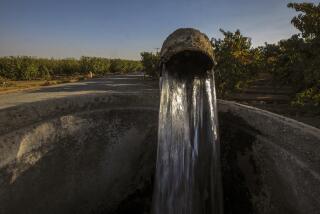Editorial: Feinstein-Boxer water bill offers real drought relief
It’s in many ways a pleasant surprise: The latest water bill introduced by California’s two U.S. senators, Democrats Dianne Feinstein and Barbara Boxer, offers the state some serious help as the Sierra snowpack becomes a less reliable source of fresh water. If the bill were to advance on its own, it would be a good base from which to work.
Unfortunately for California, the ultimate shape of legislation will likely be determined by Alaska Republican Lisa Murkowski, who chairs the Senate’s Energy and Natural Resources Committee. Murkowski is seeking a broader package with presumably much less of the environmental sensitivity that makes the current Feinstein-Boxer proposal an improvement over a Republican House bill, and even over Feinstein’s own effort last year. The test will come with committee hearings next month.
The problem with most so-called drought relief bills is that they can’t fill the wells or make the snow fall. Too often their real purpose is to reallocate water so that the powerful agriculture industry can get more. And in California, more for agriculture usually means less for the complex hydrologic system that sustains native species and supplies urban areas from Silicon Valley to Los Angeles and farther south.
By contrast, the Feinstein-Boxer proposal offers actual help in producing more usable water. It wisely follows the direction set last year by voters, who passed a bond to make state money available for new desalination, efficiency and recycling projects while leaving ratepayers — properly — to shoulder the cost of operating such facilities. Complementary federal money could move more of those projects toward completion sooner — if that provision survives in the Republican-controlled Senate.
Importantly, the bill offers honest-to-goodness relief to those communities that have actually run out of water by liberalizing rules that currently constrain federal agencies from supplying storage tanks and other emergency equipment to all but the smallest towns, and by helping them transition from wells to more reliable supplies for the long term.
The most controversial parts of the Feinstein-Boxer bill would alter some of the rules that protect endangered species in the Sacramento-San Joaquin River Delta. The senators’ proposals are far more friendly to the environment than those in the House version, and Californians might well be able to live with them, but they are based on the troubling premise that the delta is best managed by Congress rather than science. It’s anyone’s guess as to what form that assumption will take when a bill emerges from Murkowski’s committee.
Follow the Opinion section on Twitter @latimesopinion and Facebook
More to Read
A cure for the common opinion
Get thought-provoking perspectives with our weekly newsletter.
You may occasionally receive promotional content from the Los Angeles Times.










